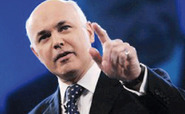
The Government’s draft child poverty strategy, published today, covers the period 2014 – 2017, alongside an evidence review, which sets out to identify the root causes of child poverty.
Iain Duncan Smith, who launched the strategy with the Liberal Democrat schools minister David Laws, said that raising educational attainment was the key to breaking the cycle of poor children growing up to become poor adults.
 ‘Through our investment in early years and the pupil premium, we are determined to give youngsters the best possible start, with schools seen by struggling families as the route to a better life for their children,’ Mr Duncan Smith said. ‘By tackling the barriers faced by disadvantaged children, raising educational attainment, and leaving no child behind, we can break the destructive cycle of poverty.’
‘Through our investment in early years and the pupil premium, we are determined to give youngsters the best possible start, with schools seen by struggling families as the route to a better life for their children,’ Mr Duncan Smith said. ‘By tackling the barriers faced by disadvantaged children, raising educational attainment, and leaving no child behind, we can break the destructive cycle of poverty.’
The consultation sets out a range of largely existing measures with the goal of ending child poverty by 2020, by supporting families into work, improving living standards and raising educational attainment.
On early years, it cites free early education places, better qualified staff in pre-school settings, and ‘a simpler early years curriculum’.
It also includes moves to reduce energy costs by cutting fuel bills by an average of £50 a year and capping water bills for low-income families.
But the Child Poverty Action Group said that unless the Government listened to concerns and took ‘bold action’ there would be a ‘costly child poverty crisis’.
Chief executive Alison Garnham said, ‘After a long wait, we’re disappointed to see a list that contains little new, or likely to make a dent in the numbers of children growing up in poverty.
‘Parents want secure jobs, living wages, fair rents and affordable childcare. This should not be too much to ask in one of the world’s richest economies, yet these things remain out of reach for millions of families. The draft strategy is weak in these essential areas with nothing to say on living wages and only limited investment in affordable homes.’
The National Children’s Bureau said more needed to be done to tackle ‘gross inequality and pernicious poverty’.
Enver Solomon, director of evidence and impact at the NCB, said, ‘The experience of growing up in the UK today is dramatically polarized between the haves and have-nots, with millions of children’s daily lives blighted by hardship and severe disadvantage. The Government has rightly recognised the importance of tackling the root causes behind this, but the strategy falls short of setting out a comprehensive cross-Whitehall approach that makes tackling child poverty a top priority across Government with every department held to account.
'Education, living standards and work all matter but tackling health inequalities for the poorest and local and regional investment strategies for deprived neighbourhoods are equally important. The reality is that families managing on low incomes are being hit hard by cuts to services, having to turn to food banks to supplement a much reduced safety net.’
Barnardo’s said it was disappointed that the strategy lacked radical and coherent solutions to in-work poverty and worklessness.
Neera Sharma, assistant director of research and policy, said, ‘With over five million UK children set to grow up poor by 2020, we need major surgery to tackle poverty not the sticking plaster solutions offered by the Government today.
‘High childcare bills, poor employment opportunities and benefits cuts have left thousands of families struggling to work their way out of poverty. Without a clear road map to tackle these complex issues, this strategy will fail to prevent more families sliding below the breadline, jeopardising the life chances of children forced to grow up in hardship.’
The charity called for new policies to have an immediate and long-term impact on hardship by bringing down childcare costs and reviewing welfare reform.
4Children said that some parents could be worse off in work than unemployed and that the strategy lacked the vision or the means needed to eradicate child poverty.
Chief executive Anne Longfield said,‘We know that millions of children suffer from multiple problems, including poverty, and we would like to see a far more radical approach to supporting families through early intervention and preventing more children from living in poverty rather than waiting until the situation has reached crisis point, with a clear target of when this will be achieved.’
Meanwhile, a row has broken out between Liberal Democrats and the Conservatives over the plans.
According to reports, David Laws is angry with the Treasury for blocking plans he had agreed with Iain Duncan Smith to introduce new child poverty measures.
The Guardian reported that Treasury officials feared that the targets would be too expensive to meet and difficult to measure.
William Higham, Save the Children director of UK poverty policy, said, 'Today’s debate about child poverty has generated far more heat than light. In all the political positioning the horrific impact of poverty on children’s lives has been neither seen nor heard.
'The families we work with around the UK tell us the same thing; child poverty getting worse at the harsh end and many more families living on a knife edge.'
- The consultation runs until 22 May.









